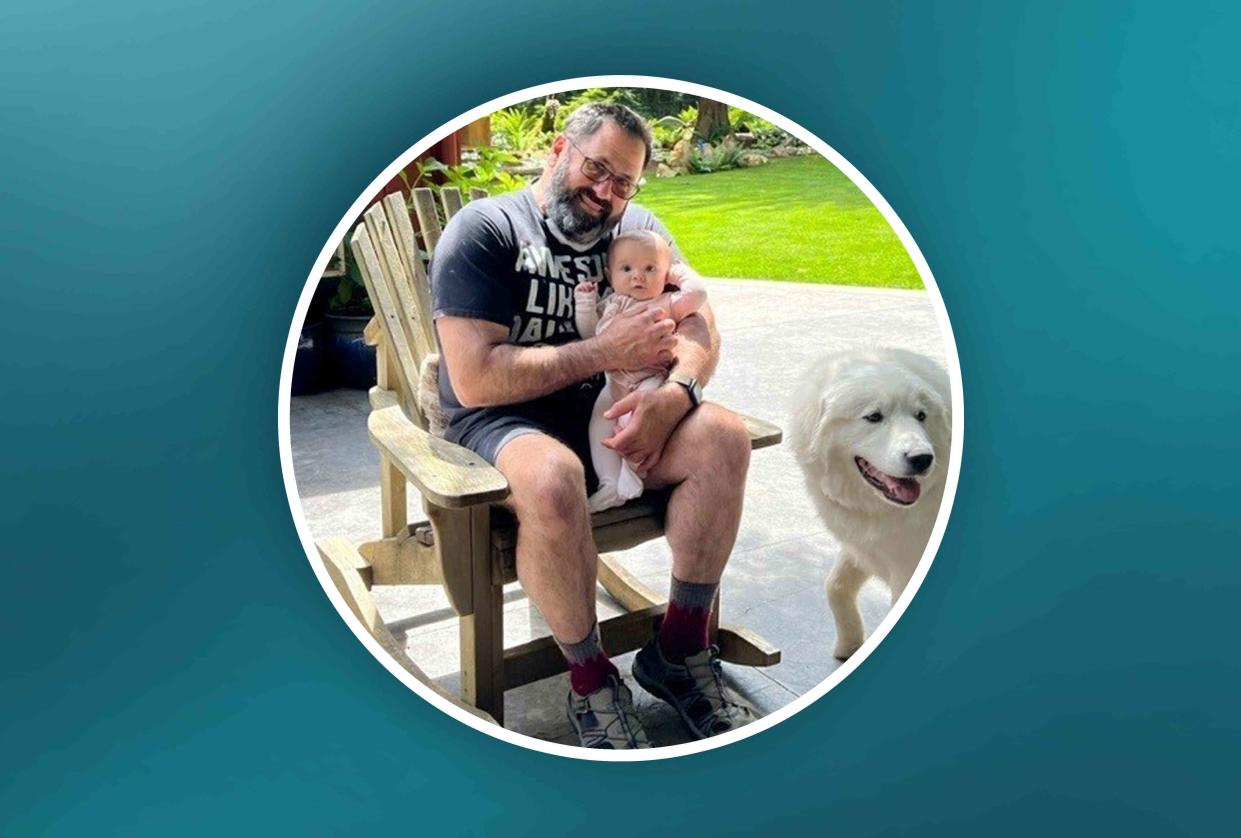When Chemotherapy Doesn't Work, Immune Therapy May Offer New Hope

Fact checked by Nick Blackmer
Key Takeaways
Immune therapies like Columvi give patients with relapsed or refractory diffuse large B-cell lymphoma an additional treatment option.
Columvi is a bispecific antibody, not a chemotherapy drug.
Columvi and other similar antibody treatments could open the way to treating more blood cancers without chemotherapy.
In 2019, Seattle resident Roy Bragadeste fell on ice, injuring his back. When he still had pain three months later, doctors ordered further testing. They discovered he had diffuse large B-cell lymphoma (DLBCL), the most common type of aggressive non-Hodgkin lymphoma.
“This lymphoma, while it’s one of the most treatable, is also one of the most aggressive,” Bragadeste told Verywell. “That fall saved my life.”
Patients with DLBCL often require additional treatment options when first-line strategies don’t work, and Bragadeste was no exception. He underwent chemotherapy, radiation, a bone marrow transplant, and CAR-T therapy. Still, his cancer had not yet gone into remission, so his doctor recommended a clinical trial for novel therapy called Columvi (glofitamab). Bragadeste was 53 at the time.
“Columvi is a form of immune therapy. We’re using an antibody to engage an immune cell and have an immune cell kill cancer,” Krish Patel, MD, Bragadeste’s doctor and a hematology oncologist at Swedish Health Services in Seattle, told Verywell. Patel served as an investigator in a glofitamab clinical trial.
Chemotherapy is still the first treatment of choice for blood cancers, including DLBCL. Antibody treatments for cancer, should they be needed, work differently than chemotherapy drugs. Most chemotherapy drugs attack all rapidly-growing cells in the body, meaning they kill off cancer cells and healthy tissues. Antibody treatments are more targeted and are designed to leave healthy cells alone.
This June, clinical trials proved successful enough to earn Columvi approval from the Food and Drug Administration (FDA) in order to treat relapsed or refractory DLBCL. More recent data showed that 56% of patients respond to Columvi, with 43% achieving remission. The medication is effective for about 18 months.
The clinical trial was successful for Bragadeste, too. He has been in remission since February 2022.
Related: How Immunotherapy Works for Cancer Treatment
How Does It Work?
According to its manufacturer, Columvi is the first “bispecific antibody” approved for the fixed-duration treatment of relapsed or refractory DLBCL. To qualify for Columvi, patients must have already received two prior types of treatment for the DLBCL.
“While initial therapy for DLBCL is quite effective, approximately 40% of patients relapse or have refractory disease,” Gwen Nichols, MD, Chief Medical Officer for the Leukemia and Lymphoma Society, told Verywell. “There are a number of second-line options—including CAR-T and additional chemo/immunotherapy regimens—but these may not be easily available or tolerable for this patient population. This disease primarily impacts older patients, and tolerance of additional therapies may be challenging.”
What Are Bispecific Antibodies?
Antibodies are Y-shaped proteins in the immune system that attach to and neutralize foreign invaders (antigens) in the body, such as viruses, bacteria, and even some cancer cells. Once an antibody fights off an antigen, it remembers it and can defend the body should it see it again.
Scientists are able to manufacture antibodies in order to treat certain diseases. Monoclonal antibody drugs are designed so both tips of the Y attach to the same type of antigen, or target. However, many diseases, such as DLBCL, have different receptor sites on the cells that antibodies can target. Bispecific antibodies are engineered to be like two halves of a puzzle piece, each tip of the Y designed to attach to a different antigen.
Because they attach to two target sites instead of one, bispecific antibody treatments offer greater versatility in treating conditions. By attaching to CD3 receptor sites on T cells and CD20 receptor sites on B cells, Columvi helps turn a patient’s T cells into cancer-killing cells.
Patel said patients with DLBCL may often receive continuous chemotherapy and other treatments until their condition gets worse or they can no longer tolerate the treatment. Columvi, on the other hand, is given over a fixed interval—usually 8.5 months. When patients begin treatment, they have a potential end date in mind.
The most common side effect of Columvi is cytokine release syndrome (CRS), a syndrome of immune activation in response to the activation of T cells. CRS can cause fever, fatigue, nausea, vomiting, cardiovascular and nervous system effects, decreased kidney and liver function, and changes in blood clotting.
While CRS can be serious, Nichols said it is manageable with medications that dampen immune activation and resolves in almost all patients.
What This Could Mean for the Future of Cancer Care
There’s still a long way to go in advancing bispecific antibody therapy for cancer treatment. Patel says that Columvi may continue to provide some long-term benefits to patients. Still, they will need long-term followup to understand if bispecific antibodies like Columvi may cure patients.
Bragadeste will continue to have bloodwork every three months, and PET scans every six months to follow his progress, which will also help researchers refine their protocols.
“Historically, we have not had a lot of effective therapies, but the high portion of the patients who responded to Columvi is very encouraging,” Nichols said. “The response rates compare favorably with other treatments that have been available in the third-line setting.”
Researchers are also investigating the potential of using bispecific antibodies earlier in cancer treatment, or alongside established treatments, instead of waiting until other treatments have been ineffective.
“Many therapies that work well as later lines of treatment are being studied at earlier stages and in combination with other medicines that have an established role in early treatments,” Patel said, adding that newer clinical trials are studying Columvi combined with other established treatment regimens. He said that Columvi could potentially treat other B-cell cancers in the future.

